Texas Baptists Committed — an organization formed nearly 30 years ago in a failed effort to stop a rightward shift in the Southern Baptist Convention before successfully slowing that tide in the Baptist General Convention of Texas — is closing its doors, citing lack of funding and the creation of a “new robust regional network” to carry on much of its work.
“With this blog post, I am announcing that — after almost three decades — Texas Baptists Committed will cease operations at the end of July 2017,” Executive Director Bill Jones announced July 8 in a posting on the Texas Baptists Committed blog. “Our board of directors voted yesterday, Friday, July 7.”
Jones, a former board member who was named as successor to founding executive director David Currie in 2011, announced last year he would step down this summer and suggested the TBC board replace him with a younger executive and a small staff.
“Unfortunately, the funds never materialized to support any of that,” he said.
Formed in 1988 and originally called Baptists Committed to the Southern Baptist Convention, the group quickly assumed the mantle of the “Gatlinburg Gang” organized in 1980 by moderate leader Cecil Sherman in response to Texas layman Paul Pressler’s stated intent of “going for the jugular” to halt what he said was a liberal drift in SBC leadership.
Moderates believed they in fact represented the mainstream of Baptist tradition and viewed the fundamentalist movement of the 20th century as not only an aberration but also a distraction undermining the convention’s main purposes of evangelism and missions.
Following the defeat of Daniel Vestal for SBC president in 1990 and the organizing of the Cooperative Baptist Fellowship the following year, Baptists Committed’s focus gradually shifted to the Baptist General Convention of Texas, one of the few Baptist state conventions to actively resist the “conservative resurgence” going on at the national level.
While conservative candidates kept winning the SBC presidency during the 1980s and into the 1990s, Texas Baptists elected moderates year after year, prompting conservatives to branch off into their own Southern Baptists of Texas Convention in 1998.
While continuing to monitor BGCT politics, Texas Baptists Committed in recent decades has worked increasingly with local churches in the process of seeking a pastor, helping search committees to spot candidates with values different from their own.
The group started out with a somewhat different function in mind. In 1985 Houston layman and Sysco foods founder John Baugh formed the Baptist Laity Journal to inform people in the pew about a growing schism within the Southern Baptist Convention.
Written from a “centrist” position, the publication joined other news outlets including SBC Today (later Baptists Today and now Nurturing Faith) and The Call, edited in Kentucky, in countering conservative party-line publications such as the Southern Baptist Journal founded in 1973 and the Southern Baptist Advocate edited by conservative leader Paige Patterson’s brother-in-law.
In 1986 Baugh and other members of the journal’s steering committee approached five current and former SBC presidents about setting up a series of public meetings for the purpose of “restoring fellowship” between factions involved in what at the time was largely viewed at the local church level as a “preacher fight” about how to interpret the Bible.
The SBC leaders, all megachurch pastors, declined. After the 1988 SBC annual meeting in San Antonio — which featured a resolution titled “the priesthood of the believer” affirming “the truth that elders, or pastors, are called of God to lead the local church” — the formation of Baptists Committed to the Southern Baptist Convention was announced during a meeting Dec. 15-16, 1988, in Dallas.
David Currie, a 36-year-old Texas rancher with a Ph.D. in ethics from Southwestern Baptist Theological Seminary, was named the new group’s coordinator. “I am convinced there is a sleeping giant out there,” Currie told Baptist Press in December 1988, “people who are not part of the fundamentalist takeover and who do not want to start a new denomination.”
Currie retired from the post in 2009 and now works as a builder and land developer in San Angelo, Texas.
Jones said fundraising has been difficult the entire 11-plus years he has been associated with Texas Baptists Committed, and it only got harder after the organization went “silent” for over a year after Currie’s departure as directors pondered its future.
While a “gut-wrenching decision,” Jones said it comes at a “propitious time.” On Aug. 1, Marv Knox, longtime editor of the Texas newspaper Baptist Standard, takes over leadership of a new regional network called Fellowship Southwest to help build the Cooperative Baptist Fellowship brand in Texas and 14 other states west of the Mississippi.
While separate organizations, Texas Baptists Committed and the CBF have always had overlapping interests. Currie, for example, is a former member of the CBF Coordinating Council, a representative body and the organization’s governing board until a restructuring adopted in 2012. A number of CBF state and regional organizations started out as Baptists Committed chapters in the 1980s.
“Our board and I are confident that Fellowship Southwest will, in its own way, continue our work,” Jones said. “Don’t get me wrong — CBF and Fellowship Southwest are not political organizations in the sense that Texas Baptists Committed has been, but they are committed to Baptist distinctives and will defend and promote them at every turn.”

